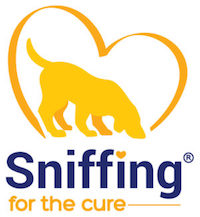As you well know, doggies’ noses are extremely sensitive. We have an extraordinary olfaction sense. Pardon my lack of humility, but it is true.
Because of our smart noses, some of us have critical jobs in our community. We help discover illicit drugs, we assist detecting explosives, and some doggies even work in the forensic medicine department to help find bodies. These are only a few examples of how we can help our humans with our scent detection skills.
Regarding our ability to detect cancer, in 1989, Drs. Williams and Pembroke were the first doctors to report a case of a dog that was constantly sniffing at a mole on the thigh of its owner. After the doctor removed the lesion, it turned out to be a skin cancer called melanoma!
My first question after hearing the story was, what was the doggie sniffing?
Apparently, cancer cells produce different amounts of volatile organic compounds (VOCs). These compounds have distinct odors and are often expressed in the exhaled breath of patients with cancer.
Scientists have tested whether trained dogs can be used to identify these breath odor markers in patients with breast, lung, colon and prostate cancer. Some of the research studies state that the accuracy of canine cancer scent detection is above 90%. Other reports, demonstrate lower accuracy levels and highlight the complexity of the rigorous training and other factors that may affect the ability of a sniffing dog to perform this type of job.
Canine odor discrimination studies are very complex, and we need more research before it is used in clinical medicine as a standard test.
Do we think canine cancer detection will replace molecular laboratory tests? No, even if canine cancer detection becomes a reality, it will need to be complemented by other conventional tests, including molecular diagnostics.
Do we think it is worth exploring? Yes. There is no population screening test for most cancers. Therefore, we should investigate all possible leads for the benefit of cancer patients, and this may include more research evaluating the training of cancer odor discrimination and accuracy of cancer canine scent detection.
More to come next week! Follow me on instagram @sniffingforthecure







No Comments